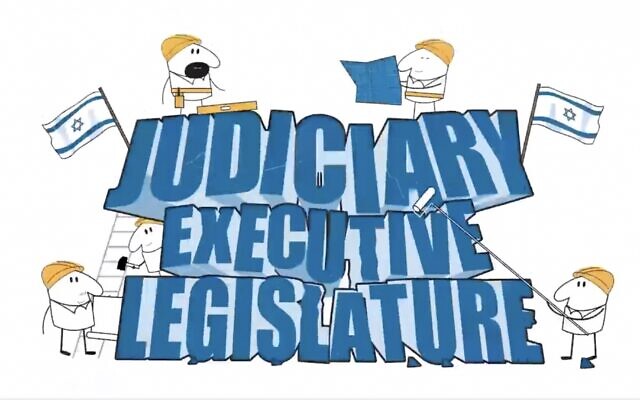
The Kohelet Policy Forum, a right-wing Israeli think tank, released an English-language video arguing for Prime Minister Benjamin Netanyahu’s proposed judicial reforms. (Screenshot via JTA. Used in accordance with Clause 27a of the Copyright Law)
Prof. Sam Lehman-Wilzig – Israel: Electing Judicial Reform: Policy or Party?
Major political issues tend to raise profound questions of political philosophy that also have serious practical applications. The current, controversy in Israel over “Judicial Reform” is an excellent case in point.
On one side is the government, led on this issue by Justice Minister Yariv Levin (ironically, “Yariv” in Hebrew means “to argue or fight”). Its argument: the governing coalition was democratically elected and therefore has the democratic right to make policy that clearly was supported by their voters.
Those opposing many of the elements in the reform package argue that: 1) Although technically legitimate, the election outcome was the product of a “fluke” – Labor not merging with MERETZ, and the Arab Union just missing the minimum threshold of 3.25% – that would have resulted in an electoral 60-60 stalemate; 2) Majority rule in a true democracy does not entail undermining the foundations of democracy itself i.e., the “majority” cannot abrogate minority rights either directly (legislative discrimination) or indirectly (eviscerating judicial oversight).
While there is a certain amount of legitimacy in the arguments of both sides, there is another aspect that is not part of the debate – the question: what is the basis of democratic, political representation? As I mentioned, this is not merely an academic dispute; it has a direct implication regarding the judicial reform process now under way.
There are two basic approaches to electoral representation. The first argues that we go to the polls to elect representative(s) – singular or plural depending on the system – who we feel are most qualified to set the best policy and make the right decisions for us as individuals and for the country as a whole. In other words, elections are personal: we place our trust in the judgment of our elected officials based on who they are and what they have already accomplished. Thus, we can call this the representative-as-trustee philosophy of elections.
The opposing approach is policy oriented. We go to the polls to elect people who will carry out specific policies that they have espoused in the election campaign. Once in the legislature (or as head of government), they have an obligation to carry out such policies as best as they can, taking into account political exigencies (e.g., within a coalition of parties) or societal changes (e.g., sudden pandemic or recession). This can be called the representative-as-agent approach to elections and governance.
So what do we have today in Israel, especially regarding the central, controversial issue of judicial reform? The coalition takes the latter approach; the opposition, the former.
Both are somewhat problematic in the present circumstances, but also have some legitimacy. First, the governing coalition. They argue that it was very clear what their position was regarding the need for major judicial reform, and that’s what they are carrying out. To a limited extent that is true – anyone closely following Israeli politics knows that in the last few years, Netanyahu and Levin have been calling for reforming the judiciary. However, the problem with this argument is twofold. First, the Likud hardly mentioned judicial reform in their entire election campaign, focusing almost completely on national security (nuclear Iran; Palestinian terror) and personal safety (crime). During the election campaign they certainly did not outline the details of the radical reform plan that they now are presenting. Second, the issue of judicial reform can hardly be considered a “neutral” issue when the candidate for prime minister (Bibi) and several other coalition partners have been found guilty of crimes, under indictment, or being seriously investigated.
Which brings us to the opposition’s stance. Here too there are two arguments put forth. First, even if a slight majority voted for the governing coalition, if several main characters are in “judicial danger,” are these the people who can be said to have a “mandate” (trusted) to reform the very institution in whose hands their fate will be decided? The answer to this: no, morally; yes, democratically. Second, even if the approach should be “policy,” democracies have limits regarding what can be legislated and what not. As the opposition today notes, no one is against judicial reform; they are against judicial revolution that is tantamount to eviscerating the entire system. This too is correct, but also raises the tough question: where does one draw a “line in the sand”? And who is to determine that? Usually that is the job of the legislature accompanied by judicial oversight – but in this case, it is precisely the relationship between the two that is being threatened!
In the final analysis, there are no “definitive” answers to the representation conundrum. In this specific case, however, there is one other way of judging what Israeli representation – and by extension, the policy of judicial reform – should entail: external analyses. When Israel’s staunchest defenders (American Jews, U.S. government), its greatest right-wing defenders overseas (e.g., Prof. Dershowitz ; Jewish and non-Jewish U.S. Congresspersons who have always strongly supported Israel; even conservative columnist Bret Stephens, former editor-in-chief of The Jerusalem Post), and also domestically (former Likud Justice Minister Dan Meridor; Likud MK and President of Israel Reuven Rivlin; three present and former and Israeli Governors of the Bank of Israel; 270 Israeli economists; etc. etc.), among many others, all lambaste the judicial reform program being pushed by Levin and Netanyahu, one can arguably assert that neither representational policy nor personal representation creeds are at work here, but rather simple self-interest (Netanyahu and others in judicial danger).
That’s not a “philosophy” of representative democracy that Israel can afford to countenance.








